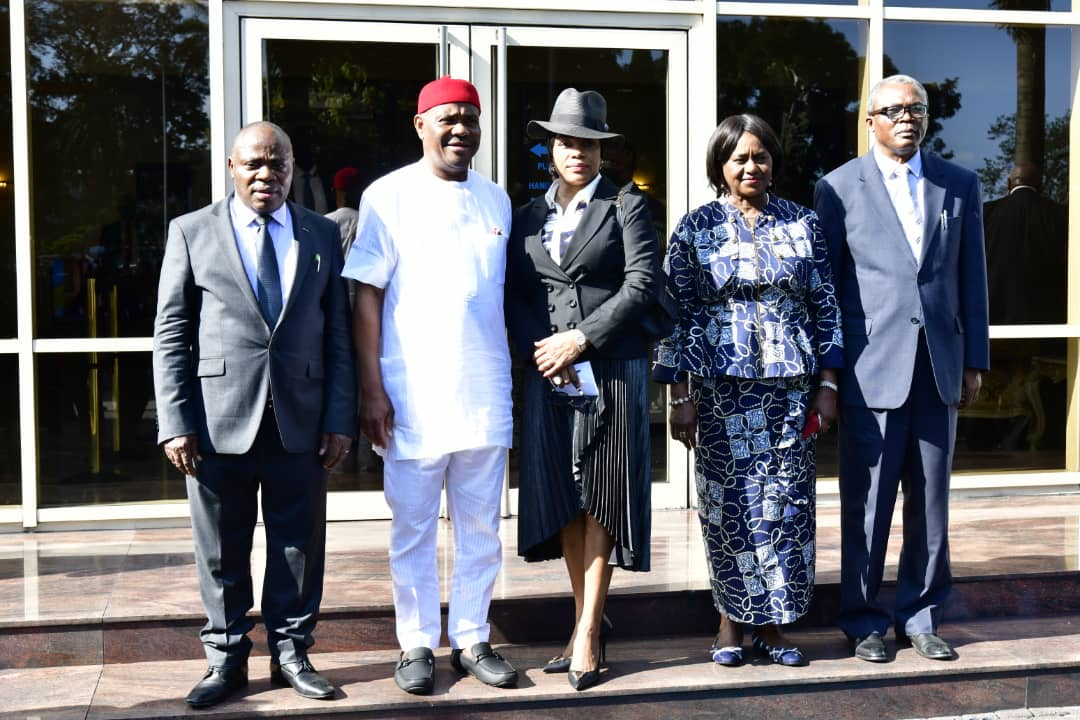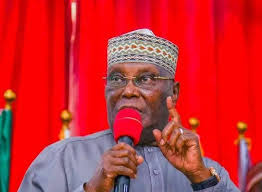News
Mimiko Set To Return To PDP …As Wike, Tambuwal, Makinde, Ikpeazu Woo Ex-Gov

Four governors elected on the platform of the Peoples Democratic Party (PDP), yesterday held talks with the immediate past governor of Ondo State, Dr. Olusegun Mimiko, on his return to the party.
Governors Nyesom Wike (Rivers), Aminu Tambuwal (Sokoto), Seyi Makinde (Oyo) and Okezie Ikpeazu (Abia) met Mimiko in his hometown, Ondo, in Ondo West Local Government area of the state.
At the meeting, Mimiko, who is the national leader of Zenith Labour Party (ZLP), agreed to return to the PDP.
Others who rejoined the PDP with the former governor included immediate past Deputy Governor and ZLP governorship candidate, Hon. Agboola Ajayi, his running mate, Engr. Gboye Adegbenro and state chairman of ZLP, Hon. Joseph Akinlaja.
Also, former governorship aspirant of PDP, Hon. Banji Okunomo; former Chief of Staff, Dr. Kola Ademujimi; Senatorial candidate, Mr. Eni Akinsola; former Special Assistants – John-Paul Akinduro, Andrew Ogunsakin, Ayo Fadoju, Afolabi Akinsiku, Bolanle Olafunmiloye, Funmilola Oluwadare and Taye Afilaka.
Tambuwal, who spoke with reporters after the close door meeting, said they visited Mimiko in order to woo him into the party.
Tambuwal, who is the Chairman of PDP Governors’ Forum, said they are rebuilding the PDP ahead of the 2023 general election. Mimiko once chaired PDP Governors’ Forum.
His words: “We are here in the beautiful town of Ondo, in Ondo State, the home of our leader, brother and friend, Dr. Olusegun Mimiko to reinvite him back to his family, his political family, the PDP and work towards rescuing Nigeria.
“I am here with the governors of Abia, Rivers and Oyo. We have had a very robust engagement with him and very optimistic we will hear something very positive from him soonest.
“The position is simple. Let us come back to reposition the PDP and rescue the country. The urgency of the matter is now. We are rebuilding the political platform, the PDP, towards ensuring that PDP is back to power in 2023.”
Shortly after, Mimiko met with stakeholders in the ZLP where it was agreed that they would join the PDP to help rescue Nigeria from the claws of the ruling All Progressives Congress (APC).
The stakeholders from across the 18 Local Government Areas of the state resolved to join the PDP after a meeting held at the residence of Mimiko.
The stakeholders resolved after deliberations to pitch their tent with the PDP.
Mimiko told the stakeholders that the ZLP is being invited to join the PDP to rescue the country from the brink of insecurity.
Stakeholders appraised developments across the nation and agreed that the PDP is the most viable platform to work with to be able to work towards winning future elections in the state and in the country as a whole.
Mimiko had earlier told members that leaders of the PDP have shown demonstrable commitment to fully integrate all willing joiners from the ZLP and accord them full membership rights in what promises to be a win for PDP members and Nigerians alike.
News
Police Rescue Kidnapped Victim, Recover Stolen Vehicle

Operatives of the Edo State Police Command have rescued one Osazee Okugbowa from suspected kidnappers.
Moses Yamu, the command’s spokesperson, disclosed this in a statement yesterday, stating that the victim was rescued by operatives of Ologbo Division, Ikpoba-Okha Local Government Area, on Friday, 8th February 2025, at about 5 pm.
Yamu said the victim was kidnapped on 7th February, 2025 by five armed men from his residence in the presence of his family in the Power Line area of Owanoba community.
He stated that the victim had since been reunited with his family after receiving medical attention.
He, however, added that the command is on the trail of the suspects in a bid to arrest them.
Meanwhile, Yamu disclosed that the command has recovered a silver-coloured Toyota Yaris with registration number 535 DR, which was snatched from its owner at gunpoint at Upper Mission Road Extension in Benin City.
He said the car was recovered by operatives of the Okuaihe Division in Uhunmwonde Local Government Area, following a distress call received on 6th February 2025.
He added that the operatives intercepted and pursued the car snatchers, who abandoned the vehicle at Iguomon Community along the Benin-Agbor Road.
Yamu said the car has been handed over to its owner while efforts are ongoing to identify and arrest the suspects.
News
Soludo Rebagged FG Rice Shared To APGA Members-APC

The All Progressives Congress, APC, in Anambra State has protested the dominance of the Chukwuma Soludo-led All Progressives Grand Alliance, APGA, in the affairs of the President Bola Tinubu-led Federal Government.
The party chairman in the state, Mr Basil Ejidike while speaking at the weekend said the dominance of Soludo in affairs that concern Anambra even at the federal level has become a challenge to the state chapter of the APC.
He said all appointments coming to Anambra from the Federal Government had nominees from APGA, while even rice distributed to all states to cushion the effect of hardship had Anambra’s share rebagged with the picture of the governor and distributed to only APGA members last Christmas.
Appealing to Tinubu, Ejidike said, “Sir, may I seize this opportunity to draw your attention to some challenges confronting the APC in Anambra State, that require your kind intervention.
“The issue of appointments made by the Federal government without recourse to the party is inimical to the growth and success of the party in our state, as these appointees do not reckon with the party at the state level.
“Whereby, most of those who have made and are still making heavy sacrifices for the party have not been adequately rewarded and appreciated, many of those who have gotten juicy Federal Government appointments in the past were mainly non-party members, drawn especially from our rival All Progressives Grand Alliance (APGA).”
He said the trend has not served as a source of inspiration or motivation to party members, and is threatening its strength and enthusiasm of emerging victorious in the Anambra 2025 project.
“At the ward, local government and state levels, our members are being discriminated against, as APGA does not recognize or reckon with those who are not their members in the distribution and allocation of government appointments and incentives.
“More worrisome is the fact that what we as a state get from the federal government as incentives and palliatives are usually sent through the state government.
“Sequel to the above, non-APGA members are denied access to them. It is on record that bags of rice sent as palliatives by the federal government were repackaged, and Governor Soludo’s pictures and APGA logo embossed on those bags, thereby giving the impression that they were provided by the governor.
“This arrangement has continued to diminish our party’s influence and reach within the state, and we are terrified to say the least.
“APC in Anambra have come with a passionate appeal, asking that you (Ganduje) intervene and save our members in Anambra from neglect.
“Your kind intervention, Sir, will bolster the morale of our committed party men and women towards the task ahead,” he added.
News
2025 Budgets: I Hope Snake, Monkey Won’t Swallow This One-Atiku

Former Vice President of Nigeria, Atiku Abubakar, has cautioned against the misappropriation of funds allocated to the health sector in the 2025 budget, referencing past bizarre claims of animals—such as snakes, termites, gorillas, and monkeys—being blamed for missing public funds. He stressed that such absurd incidents must not be allowed to happen with resources meant for healthcare.
Amid dwindling resources and reduced external support for healthcare services, Abubakar emphasised the need for transparency and accountability in the government’s $1.07 billion budgetary appropriation for the health sector. He called for mechanisms to ensure public audits and proper utilization of every kobo earmarked for healthcare.
The former vice president specifically questioned the government’s failure to provide a detailed breakdown of how it intends to spend over a billion dollars in the primary health sector. He noted that while investment in primary healthcare is crucial for providing Nigerians with accessible and affordable medical services, it would be unethical for the government to allocate such a significant sum without disclosing its intended use.
“The Federal Government has announced plans to spend a whopping $1.07 billion in the primary health sector, in addition to the N2.48 trillion initially proposed for healthcare in the budget,” Abubakar noted.
“What is even more concerning is that this additional funding is largely sourced from foreign loans, with a small portion coming from an international donor agency. Since these loans must be repaid, Nigerians have the right to know the full details and ensure that the expenditure is transparent and well-justified,” he added.
Abubakar further criticized the government for failing to commit to any physical infrastructure projects within the health sector, suggesting that this raises red flags about potential mismanagement or fraud.
According to the government, the funds will be used to improve governance in healthcare and strengthen primary health services nationwide, including recruitment, training, and retention of healthcare workers and teachers. However, Abubakar argued that the government has a poor track record in managing public funds, particularly in humanitarian services, and that Nigerians should not accept vague explanations without clear accountability mechanisms.
“It is difficult to trust this administration’s claims, especially given its history of misleading Nigerians about investments in social infrastructure,” he said.
He pointed out the government’s misleading statements about improvements in tertiary hospitals, despite the reality that many of these institutions lack basic amenities, such as stable electricity supply.
“The Tinubu administration has failed in the health sector due to poor funding. Major diseases in primary healthcare, including malaria, tuberculosis, and HIV/AIDS, remain critical challenges. If this government is truly committed to healthcare, it must clarify how it plans to use this intervention fund to tackle these diseases,” Abubakar stated.
He also criticized the government’s response to the recent withdrawal of American aid for HIV/AIDS treatment, noting that its proposed intervention of N5 billion is grossly inadequate.
“If the Tinubu administration does not present a clear framework for managing this significant health sector investment or subject it to proper legislative scrutiny, then it may be safe to conclude that this is yet another case of public funds being mismanaged under the guise of serving Nigerians,” Abubakar concluded.
-

 News5 hours ago
News5 hours agoNigeria, Venezuela Explore Mining Opportunities
-

 Niger Delta3 days ago
Niger Delta3 days agoNDDC Begins N50,000 Monthly Payment To 10,000 N’Delta Youths
-

 Sports8 hours ago
Sports8 hours agoChelsea Fall Short Against Brighton
-
Maritime4 hours ago
Navy Rids Calabar Waterways Of Piracy, Oil Bunkering
-
Niger Delta3 days ago
Police Nab Pupil For Threatening Schoolmates With Pistol
-

 News3 days ago
News3 days agoRetirement: Ignore PSC’s Directive, Remain In Office, IGP Tells Officers
-

 Politics7 hours ago
Politics7 hours agoAhead 2027, Obidient Movement Engages Stakeholders In Borno
-

 Oil & Energy6 hours ago
Oil & Energy6 hours agoNNPC Debunks Explosion Claim In Warri Refinery

